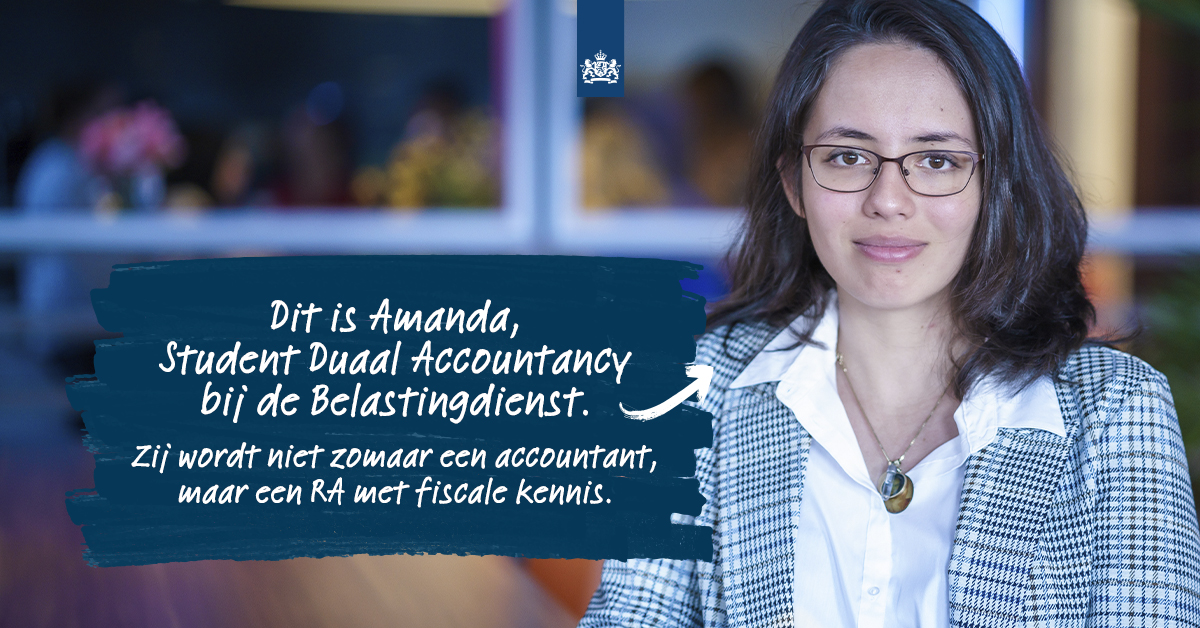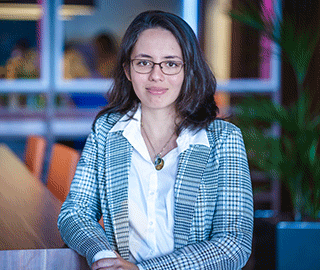Translation banner: This is Amanda, Trainee Accountancy at ‘de Belastingdienst’. She won’t just become an accountant, but a RA with fiscal knowledge.
For the Dutch version, click here
The first time I met with the Tax and Customs Administration (in Dutch: de Belastingdienst) as a potential future employer was at the Tax & Customs Museum in Rotterdam. I was with my fellow students of tax law on an excursion and the then General Director of the Tax and Customs Administration welcomed us with a chat. He did this so openly and enthusiastically; especially his passage about the training and development of employees sparked my interest. Working for the government had never come across my mind, but suddenly it was at the top of my list.
Studying and working in accountancy
I studied business administration and tax law, but I am also very good with numbers. Savings plans and budgets: leave that up to me. Afterwards, I soon discovered that you can do the dual track accountancy at the Tax and Customs Administration. In this trajectory you will develop yourself into a fiscal accountant within a few years. You will take internal courses at the Tax and Customs Administration Academy, follow a master’s and postmaster’s degree to become a chartered accountant at a University of your choice – which the Tax and Customs Administration will of course pay for you – and at the same time you will gain work experience. I’ve been on the road for over a year now, and I have already learned so much.
Lessons from experienced specialists
As a chartered accountant at the Tax and Customs Administration, you do not audit annual accounts, but tax declarations. So, I will not just become a regular accountant, but an accountant with a good dose of tax knowledge. This is why I consider my master’s degree in Accounting & Control at the VU to be just as important as the courses provided by the Tax and Customs Administration. From experienced accounting and control colleagues, I learn everything about control techniques, taking samples, recognizing fraud signals, and having conversations. Next to this, I also learn about the various means of taxation, such as income, turnover and corporate tax.
“I don’t have a company car, but I do have a 36-hour week in which I work hard and get enough time to study. That’s worth a lot more than the material extras to me.”
Doing practical internships
You test the knowledge that you are taught directly in practice. In the dual track accountancy you will conduct three internships: one at the organizational unit, Small and Medium Enterprises (SME), and two at Large Enterprises. I have just completed my first internship at an SME. I went to check up on various companies, from a wholesaler that sells hair products to a remedial teaching agency. Knowing your theoretical material is important, but when you have the reality of such a company in front of you, and you enter into a conversation with the entrepreneur and/or advisor, the learning process really takes off from there.
Lots of time to study
For me, working for the Tax and Customs Administration brings a pleasant and safe working atmosphere. You can make mistakes and you can always contact your fellow students, internship supervisor or mentor. For the dual students there are also regular peer review meetings organized in which we can discuss everything we run into. In addition, I value the time I get to develop myself as a good working condition. I always say this: “I don’t have a company car, but I do have a 36-hour week in which I work hard and get enough time to study. That’s worth a lot more than the material extras to me.”

















